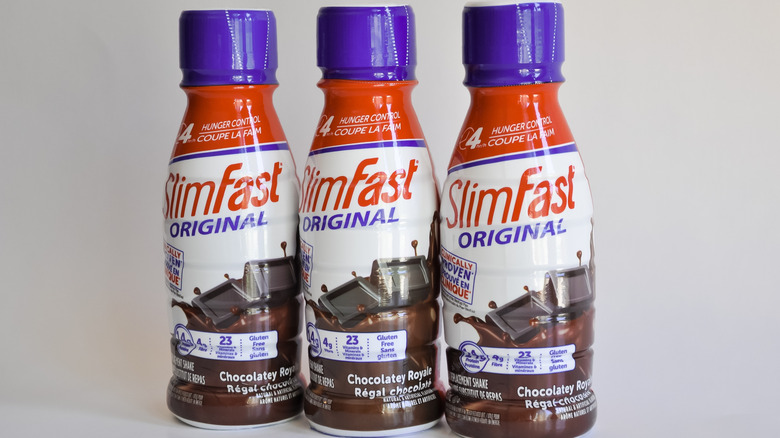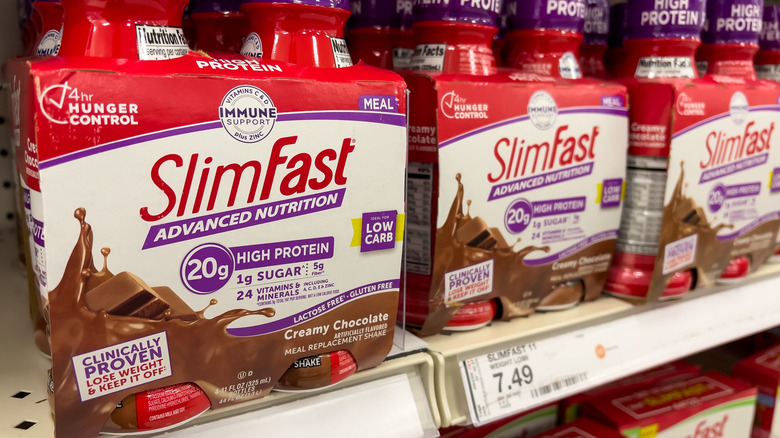What Happened To The Once-Popular SlimFast?
If you were old enough to be a teenager or adult during the 90s, you unfortunately had to live through the peak of diet culture. Does the slogan, "A shake for breakfast, a shake for lunch, and a sensible dinner," ring a bell? That's the somewhat questionable catchphrase from SlimFast, the famous, celebrity-endorsed weight-loss brand that took the '80s and '90s by storm. Everyone and their diet-fixated mother was sipping on the company's meal replacement shakes. So what exactly happened to SlimFast?
By 2000, SlimFast was generating a staggering $1 billion in annual sales. It wasn't just a lineup of meal replacement shakes, bars, and protein drinks but also a subculture and a lifestyle, backed by celebrities like Whoopi Goldberg and Kathy Lee Gifford. As the name obviously implies, the concept of becoming thinner quickly was wildly appealing at a time when the heroin-chic fashion look and being skinny were in.
At this time, health and wellness messaging was still largely tied to weight loss and calorie cutting, so SlimFast became the holy grail. It offered a simple way to shed pounds without having to add up calories or even cook. It was dieting made easy, perfectly packaged for the on-the-go lifestyle of the late 20th century. But as we've seen with most diet trends, such as Atkins or the Pegan diet, they don't last forever — and this also proved true for SlimFast.
The demise of a diet icon
By the early 2000s, SlimFast's grip on the weight-loss world started to loosen. Consumer preferences were changing, and so was the conversation around what it meant to be healthy. By the time Kate Moss uttered the famous phrase, "Nothing tastes as good as skinny feels," in a 2009 interview, being skinny wasn't the ultimate goal of health and wellness. Moss infamously received backlash for promoting unhealthy dieting practices, and super low-calorie diets like the one promoted by SlimFast were simply no longer cool.
The American idea of health and dieting began changing, and people started turning away from processed products in favor of whole, natural foods. SlimFast's shake formulas included ingredients like artificial sweeteners, stabilizers, and preservatives, and this felt outdated after the emergence of the clean eating movement. Instead, fruit and vegetable smoothies and vitamin-loaded green juices gained traction and began to push out processed weight-loss products that no longer fit with modern health and wellness trends. Consumers were starting to wake to the fact that something like a processed meal replacement shake that promised fast weight loss could not support health in the long term.
The company went through many ownership changes in the 2000s, which didn't help it maintain a consistent brand identity. Unilever (which bought the company in 2000) sold it in 2014 to the private equity firm Kainos Capital, which sold it to Glanbia. Most recently, in September 2025, Heartland Foods announced that it would be purchasing the company from Glanbia. At one point, SlimFast launched keto-friendly products to try to remain relevant, but this didn't quite push the company back into its former spotlight. Today, SlimFast still exists, but thankfully, it's no longer touted as a magic fix.

